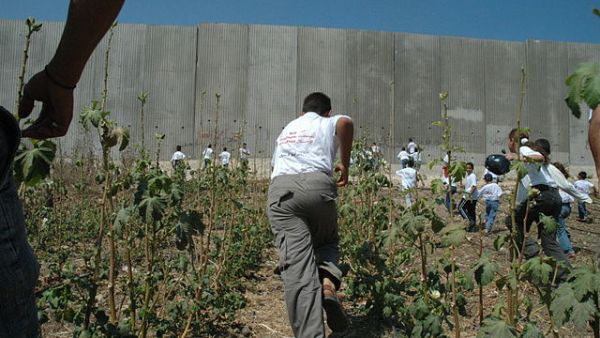- In the occupied West Bank, Israel is alloting vast water resources to settlements, at the expense of Palestinians
- Local wells have dried up as a result of Israeli policies, forcing Palestinians to buy back their own water
- Last month, Palestinian farmers in one village were forced to protest after their water was cut off
- Instead of restoring the water, when supplies were returned they had reduced by half
Israeli settlers in the West Bank consume seven times more water per person than Palestinians, according to Palestinian rights group Al Haq.
The disparity is so stark, Palestinian rights organizations have described the situation as “water apartheid."
Water as a weapon. #BDS pic.twitter.com/w9vusKvRRz
— Achmat (@achmatpandy) October 18, 2017
International groups such as Amnesty have also slammed Israel for “severely restricting Palestinians’ access to water across the West Bank and Gaza.”
As long as eight years ago, Amnesty issued a report calling on Israel to “end its discriminatory policies [and] immediately lift all the restrictions it imposes on Palestinians’ access to water.”
Yet, Al Jazeera reported on Saturday, the discrimination continues.
Last month, Palestinian farmers in the Jordan Valley village of Ein al-Beida held a peaceful protest after Israel cut their water supply for more than a week, the network indicated.
When the water was eventually returned it was less than half the previous amount. With the protest achieving little, villagers have turned to the mayor of nearby Tubas to appeal for water.
Ein al-Beida village, northern West Bank, protest against Israel's decision to cut off the water supply to their village for over a week. pic.twitter.com/AM92Gvk9bu
— Quds News Network (@QudsNen) September 12, 2017
"They gave us the excuse that there's not enough water underground," farmer Mahdi Foqaha told Al Jazeera.
"In reality, Israel doesn't want us to live here any more … We just want the Israelis to let us extract our own water."
The suspension of water supplies, villagers suggested, was enacted as collective punishment after a neighboring village made an illegal connection to the water supply.
After occupying the West Bank and Gaza in the 1967, Israel seized control of all water resources.
In the 50 years since, Palestinians in the West Bank have depended on the Israeli authorities to allocate them water supplies, with permits for water infrastructure rarely granted.
That provision, they suggest, is increasingly little. Instead, they are forced connect pipes to the water network illegally, risking their supply being cut off at any moment.
- Palestinians use global Twitter storm to say ‘enough is enough’
- Not everybody likes Banksy’s hotel in the West Bank
Meanwhile, settlers enjoy considerable resources, using an average 450 liters per day per household, according to Al Haq. This compares to just 60 liters on average for Palestinians.
To put that into context, the World Health Organization says that an individual needs 100 liters of water a day for food preparation and to maintain personal hygiene.
While Palestinians depend on rain-fed crops, Israeli settlers can produce irrigated crops which are are on average 15 percent more profitable, according to EWASH.
Mekorot, Israel’s national water company, has been targeted by the international BDS campaign. The movement accuses Mekorot of being “responsible responsible for water rights violations and discrimination since the 1950s.”
Take Action: Mekorot cuts water for tens of thousands of Palestinians | Stop the Wall https://t.co/UFnri1rk0O
— BDS Movement (@BDSmovement) 24 June 2016
It is this company that has exploited most of the Mountain Aquifer, the main source of underground water in Israel and the Occupied Palestinian Territories (OPT), to feed Israeli communities.
Palestinians have access to only 20 percent of the Aquifer water, while Mekorot has previously reduced water supply by as much as 50 percent in summer to feed increased demand in the settlements.
The result is that wells that used to feed Palestinian villages, including Ein al-Beida which protested last month, dried up long ago. Palestinians are now forced buy back water from Mekorot at a high cost.
In fact, it is not just Palestine that suffers from Israeli appropriation of water resources.
According to Al Haq, the water of the Jordan river should be shared between Jordan, Israel, Syria, Palestine and Lebanon, with Jordan taking the largest share. Instead, 50 percent is exploited by Israel.
Settlements were described by the U.N. in 2016 as ‘a flagrant violation of international law.’ However, they continue to grow with work on a new settlement beginning over the summer under the full approval of Israel's Prime Minister Benjamin Netanyahu.
As long as illegal settlements expand in occupied Palestinian territory, the water and other resources available for Palestinians will continue to diminish.







